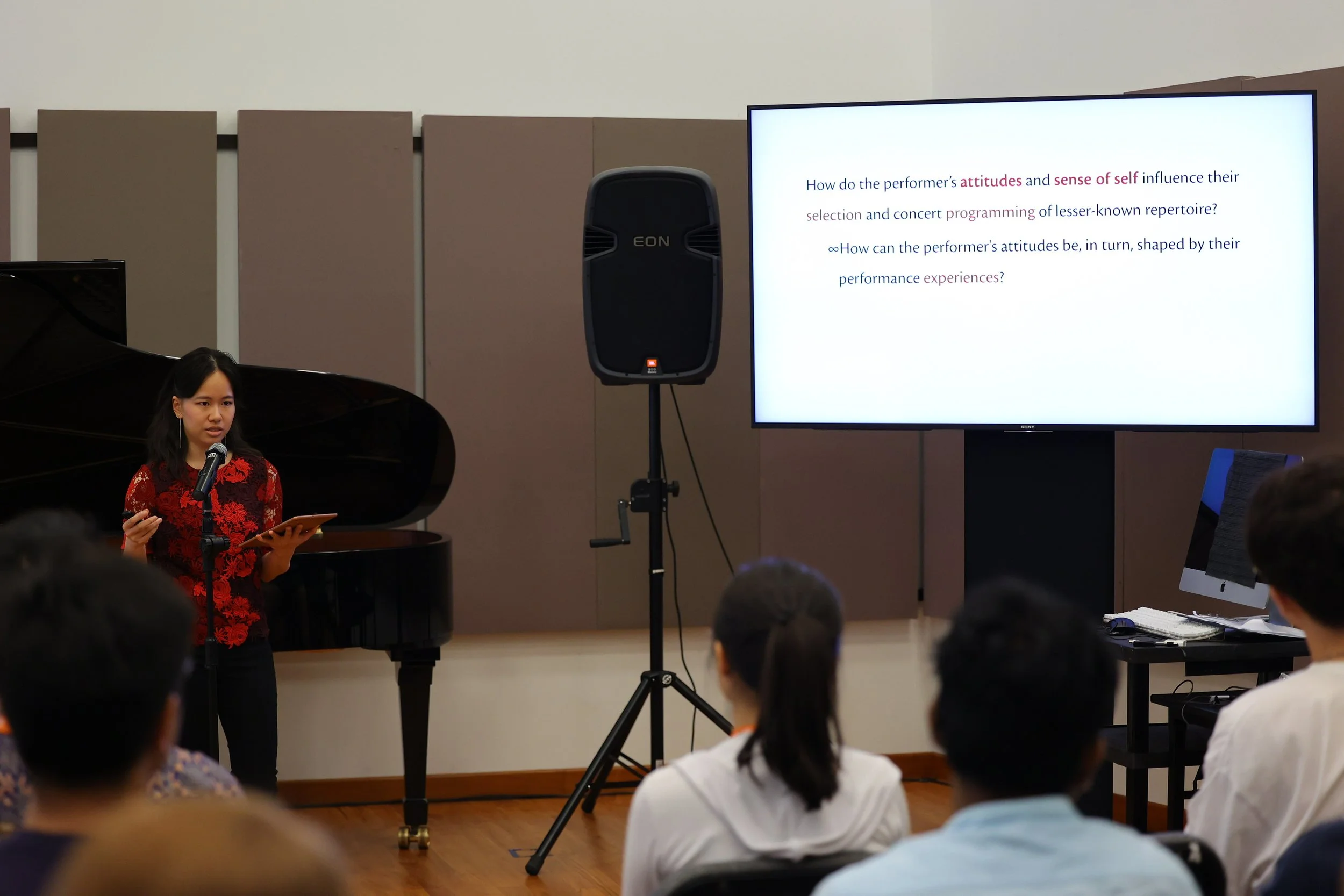PhD thesis
How Pianists Programme Lesser-known Solo Repertoire: An Autoethnography through Clara Schumann’s Sonata and Interviews with Four Pianists (2024)
The Western classical music canon is undergoing its biggest transformation in decades, driven by composer anniversaries, sociopolitical movements, and diversity quotas. Despite increasing scholarship on women musicians and concert studies (Mathias et al., 2022; Tröndle, 2021), no study has examined how performers programme lesser-known repertoire, or the discourses generated by such practices. To achieve longevity and meaningful inclusivity, more open discussions of programming processes are necessary. This thesis addresses the following central question: How does the solo pianist’s sense of identity and agency as a performer interrelate with their selection and programming of lesser-known repertoire?
The line of inquiry focuses on the pianists’ approaches to women composers' music as a basis, then examines more broadly their approaches to repertoire that is lesser-known due to stylistic unfamiliarity or the composers’ other demographic characteristics. Drawing upon biographies, gender studies, historical concertising strategies, and audience research (Citron, 2000; Davies et al., 2021), Study 1 is an autoethnography where I programmed and performed Clara Wieck-Schumann’s Piano Sonata (1841–42) in four different concerts. To position performers as co-creators of meaning and value, the autoethnography is integrated with a concurrent Study 2, applying Interpretative Phenomenological Analysis to the interview accounts of four pianists experienced in performing a range of lesser-known music. Five overarching themes emerged from the integration of both studies: ‘musical, social, and personal connections’, ‘repertoire interrelated with professional identity’, ‘interpretative strategies and frameworks’, ‘perceptions of role as performer and of audiences’, and ‘programming agency’. These findings offer novel insights into how performers are imbricated in the repertoire and programming choices they make, and strongly suggest that empowering the creative agency of performers is essential to lasting change in the classical music canon.
Citation:
APA
See, N. H. (2024). How pianists programme lesser-known solo repertoire: An autoethnography through Clara Schumann’s Sonata and interviews with four pianists [PhD, Royal College of Music]. https://researchonline.rcm.ac.uk/id/eprint/2532/
Chicago
See, Ning Hui. ‘How Pianists Programme Lesser-Known Solo Repertoire: An Autoethnography through Clara Schumann’s Sonata and Interviews with Four Pianists’. PhD, Royal College of Music, 2024. https://researchonline.rcm.ac.uk/id/eprint/2532/.
MLA
See, Ning Hui. How Pianists Programme Lesser-Known Solo Repertoire: An Autoethnography through Clara Schumann’s Sonata and Interviews with Four Pianists. 2024. Royal College of Music, PhD. researchonline.rcm.ac.uk, https://researchonline.rcm.ac.uk/id/eprint/2532/.
As the thesis is embargoed until March 2026, please contact me directly if you want a copy.
Conference papers:
Performer’s Process — Concert Programming for Women Composers at the Performers(') Present 2023: International Artistic Research Symposium, Yong Siew Toh Conservatory of Music, Singapore, 25-28 October 2023 (this paper focused on Study 1)
"I’m known as this performer": Pianists Concert Programming for Lesser-known Repertoire at the Royal Musical Association Annual Conference, University of Nottingham, 14-16 September 2023 (this paper focused on Study 2)
The Fourth International Women's Work in Music Conference, Bangor University, 4-7 September 2023
Themenoffene Tagung der Fachgruppe Frauen- und Gender-Studien der GfM, Hamburg, 2 June 2023
As a Pianist between Ideology and Action: Concert Programming for Clara Schumann’s Sonata at the "Women at the Piano" International Conference, University of California Irvine, 16-19 March 2023 (this paper focused on Study 1)
European Platform for Artistic Research in Music (EPARM) Conference, 8-9 April 2022, Royal Academy of Music, London
”Gender and musicianship” study days, 24-25 January 2022, Sibelius Academy, Helsinki, Finland
RMA-BFE Research Students Conference, 6-8 January 2022, University of Plymouth, UK
Institute of Austrian and German Music Research Inaugural Conference, September 17–18, 2021, University of Surrey, UK
RMA-BFE Research Students Conference, January 2021, University of Cambridge, UK (co-chair of panel on Covid and Music Education)

European Platform for Artistic Research, Royal Academy of Music, London

Royal Musical Association Annual Conference, University of Nottingham

Westminster Music Library

Yong Siew Toh Conservatory of Music Singapore
